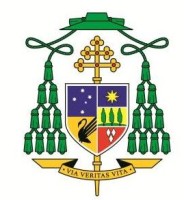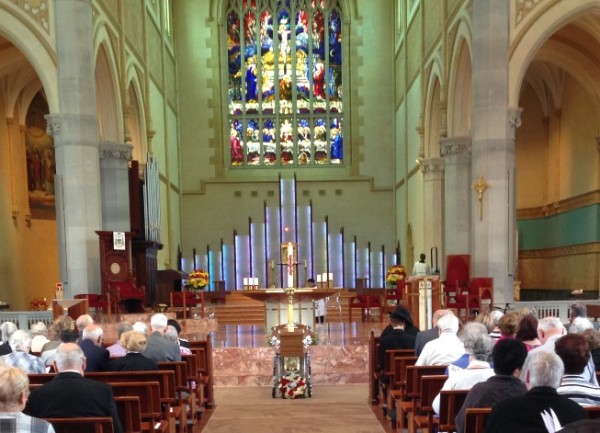Homily at Fr Cunningham's Requiem Mass

Requiem Mass of Fr Pat Cunningham
Homily by the Most Rev Timothy Costelloe SDB, Archbishop of Perth
on Thursday 13 November 2014
at St Mary’s Cathedral, Perth
For your faithful, Lord, life is changed not ended, and when this earthly dwelling turns to dust an eternal dwelling is made ready for them in heaven.
With these simple words from the Preface for the Dead the Church expresses one of the most profound and central aspects of our Christian faith. Indeed, if we did not believe this, then our faith would be meaningless. As a priest, as a man of faith, Fr Pat certainly believed this but I think it is true to say that for those who accompanied him in his last few days, when it was clear to them, and to Fr Pat himself, that he was dying, this faith in the life that awaited him was not just some form of conventional religion but a deeply felt and unshakeable conviction. Pat was serene, grateful and very much at peace with his situation. One of the nurses in Royal Perth, who did not know that Fr Pat was a priest, remarked to someone last Thursday or Friday that he must have been a man of faith to be able to face his death with such courage and peace.
Fr Pat was born in Perth on March 17, 1929, the only child of Francis Aloysius Cunningham and Rita Mary Faulkner and was baptised at St Brigid's in West Perth. He would have turned 86 on St Patrick's Day next year. He was educated at St Paul's Montessori School from 1934 to 1936 and then at the Christians Brothers College, first at Highgate for one year and later at Aquinas as one of the foundation students. Thus began a life-long connection with the Christian Brothers among whom he found both great support and great friendship. As most of you know he lived at Clontarf from 1973 until he moved to the units in Redcliffe a few years ago. The Brothers welcomed him among them and included him in the life of their community, for which Pat was always grateful. At the same time he was very sensitive to the rhythms and structures of the Brothers' way of life and always knew when to step back. He derived great support from the Brothers but never wished to impose himself on them. They on their part appreciated him greatly and as the nature of their own communities changed they were very keen to continue to have him among them. As a diocese we are very grateful to the Brothers for their generosity and their support of Fr Pat.
As well as being a foundation student at Aquinas, Pat was also a foundation student at St Charles seminary, at the tender age of twelve years. In one of his letters about this he described himself as a callow youth who in the fading months of 1941 had allowed himself to be persuaded by Launcelot John Goody to come and help him found St Charles' Provincial Seminary. How grateful we should be for Archbishop Goody's powers of persuasion!
Fr Pat would be at Guildford for six and a half years before he set sail for Rome where he was ordained in 1951. He would then give sixty-three years of his life to the Lord and to his people as a priest of our Archdiocese. From 1952 until his appointment as editor of The Record in 1971, Pat would minister, either as assistant priest, priest in charge or parish priest, at parishes in Highgate, Applecross, York and Narrogin, Subiaco, Leederville, Chidlow and Wundowie, Kensington, Nedlands and Mundaring.
For a time Fr Pat was also chaplain at what is now St John of God Hospital in Mt Lawley, and in his retirement he has been very much involved with the Catholic Education Office in Leederville where he celebrated a weekly Mass for the staff, and with the Sisters of Mercy at Wembley. He was also chaplain to the Majellans from the time of their establishment here in Perth, and to the St Vincent de Paul Society, and he was renowned for his work with couples preparing for marriage. Pat will also be remembered for his work in keeping our diocesan statistics up to date as he will for the fact that right up until his death he was still attending meetings of the DRC.
Even by simply listing these various appointments and commitments, and no doubt there are others I haven't mentioned, we gain some sense of Fr Pat's extraordinary outreach. Who can tell how many people he has touched, how many families have been helped, how many broken hearts have been healed, how many confused and worried people he has been able to point in the right direction? It is one of the most remarkable, and most humbling, aspects of our Catholic tradition that our priests become such important people in the lives of so many. It is a great privilege but also a heavy responsibility. Fr Pat shouldered it willingly, generously, and faithfully.
Although Fr Pat did work in a number of our parishes, both in the city and in the country, for much of his priestly life among us he has been very much at the wider service of the Archdiocese. This is particularly true of course as regards his long period as editor of the Record. His great friend, Pat McVittie, whom I do want to acknowledge and thank very sincerely this morning for her wonderful care and support of Fr Pat and for the friendship she shared with him over so many years, told me of the way in which the two of them would drive all over the metropolitan area hand-delivering the Record to the various parishes. As I understand it, as there was no front seat in the little car they used, Pat was relegated to the backseat and had to jump in and out of the car depositing the copies of the Record at the door of the various presbyteries as Fr Pat did the driving.
In speaking about the priesthood, which in reality means speaking about priests, it is very important that we go beyond the things priests do to the deeper reality of who our priests are, both in themselves and in their place within our Church. The two, of course, are meant to co-incide. God calls flesh and blood men to the priesthood and asks them to allow him to mould and shape them, in their own unique individuality, into living images of the Good Shepherd. In our Catholic tradition, our priests are chosen and empowered by God through their ordination to keep alive, to keep clearly before our eyes, the truth that Jesus continues to lead us as our Good Shepherd, that is, as the one who brings us to green pastures and still waters, who guides us through times of darkness and shadow in our lives, who never deserts us, who goes in search for us when we are lost, who carries us on his shoulders, and who is ready even to lay down his life for us.
As still relatively new in the Archdiocese I am very conscious that almost everyone else here in the Cathedral knows Fr Pat better than I do. I only know him personally as an elderly and increasingly frail man. Most of you know him also as a young, passionate, energetic man, full of interests, enthusiasm, hopes and dreams. So many of you have your own precious and treasured memories of him. As we prepare now to enter into the mystery of the Eucharist, the mystery he celebrated so often, I would like to invite you all to pause for a few moments and remember the ways in which Fr Pat was, personally for you, a living image of Jesus the Good Shepherd.
And as you do, remember this as well: for Fr Pat life in now changed not ended. As his earthly dwelling turns to dust an eternal dwelling is made ready for him in heaven. May the Lord welcome him home and lead him to that dwelling and may he enter there with great joy. May he rest in peace.

Fr Pat's coffin present before the Sanctuary where he had often met with Christ and had invited others also to meet with Him
